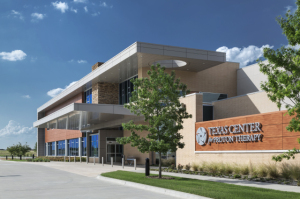by
Thomas Dworetzky, Contributing Reporter | November 16, 2015

Courtesy of The Texas
Center for Proton Therapy
“The power and promise that proton therapy offers for better outcomes and improved quality of life provides new hope for cancer patients.” said Dr. Andrew Lee, medical director, Texas Center for Proton Therapy, in a statement.
The Center’s four physicians and other medical and support team members have more than 70 years of combined proton therapy experience. Until now, Dallas/Fort Worth was the largest metropolitan area in the U.S. without a proton therapy treatment center.
Texas Oncology delivers nearly half of all cancer care in Texas, according to Dr. Steven Paulson, Texas Oncology chairman and president. "Texas Center for Proton Therapy is a major accomplishment in furthering our mission, which is to give our physicians and patients access to the full range of advanced cancer treatments, while delivering personalized, compassionate care,” Paulson said.



Ad Statistics
Times Displayed: 62819
Times Visited: 2069 Ampronix, a Top Master Distributor for Sony Medical, provides Sales, Service & Exchanges for Sony Surgical Displays, Printers, & More. Rely on Us for Expert Support Tailored to Your Needs. Email info@ampronix.com or Call 949-273-8000 for Premier Pricing.
In September,
The Texas Tribune interviewed Lee about proton therapy. Lee was at MD Anderson before joining the Texas Center for Proton Therapy. In 2006 he helped initiate the clinical program there and treated the first patient with the new technology. Lee said of this technique at that interview, "The nice thing about protons, unlike conventional X-rays, is that they can actually deposit their radiation over a specific area or depth. If you’ve ever gotten an X-ray of your chest or your leg, the reason you can see an image is because the X-rays go all the way through and they hit a piece of film and that [results in the subsequent] image. Whereas protons can stop sort of halfway in the body and perhaps more precisely right after a tumor, where an X-ray can’t do that."
The opening is a bright spot in the proton therapy world. It gives the center an 18-month head start on UT Southwestern Medical Center, which plans to operate the Dallas Proton Treatment Center in 2017 — although its developer is now under bankruptcy protection,
according to D magazine.
Despite problems with funding at some centers, “there’s no doubt in my mind that all the leading cancer centers are going to offer proton therapy,” John Frick, interim executive director of the Maryland-based National Association for Proton Therapy, told the Dallas publication.
Lee also spoke about the relative costs of treatment to the Tribune:

